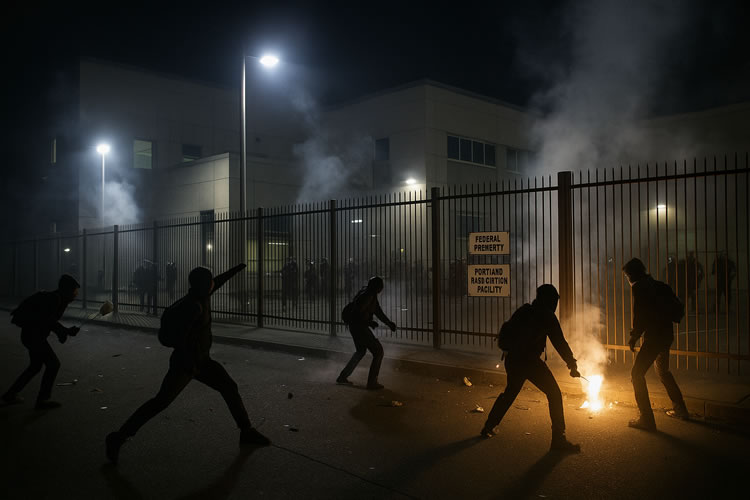President Donald Trump’s decision to deploy National Guard troops to Chicago and Portland has drawn sharp criticism from some state leaders — including Vermont Gov. Phil Scott — who called the move “unconstitutional.” But the deployments, limited to federal facilities according to administration statements, mirror long-standing federal precedents that date back more than two centuries.
Federal Troops in Democratic-Led Cities
The deployments, announced in late September, are aimed at bolstering security around federal properties, including U.S. Immigration and Customs Enforcement (ICE) facilities in Portland, Oregon, and the Chicago area. The White House has said the action is intended to protect federal agents and enforce immigration law, not to police city streets.
According to reporting from WCAX and VTDigger, roughly 500 Guard members from Illinois and Texas were called up for the Chicago mission, with several seen near an ICE facility west of downtown. A separate order involving 200 Oregon Guard members remains tied up in federal court following two temporary injunctions.
Trump argued the deployments are necessary to “defend federal property and uphold federal law.” Illinois Gov. J.B. Pritzker and Oregon officials have opposed the move, saying it violates state sovereignty. Vermont’s Scott joined those critics Thursday, calling the action “unconstitutional.”
“I don’t think our Guard should be used against our own people,” Scott said at a press conference in Waterbury. “Unless there’s an insurrection, the military should not be used against our own citizens.”
Scott also said he would reject any similar federal request to use Vermont’s National Guard and warned that the move “further divides and threatens people.”
Crime and Context
Supporters of the deployment point to persistent violence and vandalism around ICE and federal facilities in both cities, where protests and counterprotests have sometimes turned violent.
Critics, including VTDigger and other outlets, note that overall violent crime rates in Chicago and Portland have declined slightly from pandemic-era highs. But those statistics remain far above pre-2020 levels. In Portland, the area around the ICE building has experienced repeated clashes between demonstrators and local police, with city officials reluctant to intervene directly.
Former Illinois Gov. Rod Blagojevich told Tucker Carlson that Pritzker’s resistance was “political,” noting that the same governor authorized Guard protection during the 2024 Democratic National Convention in Chicago. “He was more than happy to do that,” Blagojevich said. “But he won’t do it when President Trump wants to help the Chicago police fight crime.”
A Familiar Federal Power
Despite the uproar, the federal use of the National Guard and active-duty troops to enforce federal law has deep precedent.
In 1957, President Dwight Eisenhower sent the 101st Airborne Division to Little Rock, Arkansas, to enforce a Supreme Court desegregation order. Five years later, President John F. Kennedy mobilized roughly 30,000 troops, deploying about 3,000 federal soldiers to the University of Mississippi to enforce the enrollment of James Meredith, the school’s first Black student, amid violent riots. Both deployments were made over the objections of state officials and were widely praised at the time as necessary to uphold the rule of law.
The legal authority for such deployments lies in the Insurrection Act and Article II of the Constitution, which allow the president to federalize the National Guard and use it to enforce federal laws when states obstruct them.
Federal courts have repeatedly upheld that power. In Perpich v. Department of Defense (1990), the Supreme Court ruled that the president and Congress may order Guard units to active duty for federal purposes, even without a governor’s consent.
🍁 Make a One-Time Contribution — Stand Up for Accountability in Vermont 🍁
Federal Property vs. State Jurisdiction
The key legal question in 2025 centers not on whether the president can deploy the Guard, but where and for what purpose. The administration maintains that troops are operating under Title 10 authority, meaning they are federal forces assigned to protect federal sites — not state-controlled Guard units patrolling city streets.
Under federal law, particularly 40 U.S.C. §1315, the president has the duty to safeguard federal property and personnel. Such missions fall outside the Posse Comitatus Act’s ban on using the military for general law enforcement.
In Chicago, federal filings describe a narrow mission to “secure federal facilities and ensure ICE operations are not unlawfully obstructed.” If accurate, that would make the operation legal under existing statutes.
A Divided Response
While Scott and several Democratic governors have denounced the deployments, others have endorsed them. Tennessee Gov. Bill Lee said he would welcome federal troops to Memphis to assist local law enforcement, calling the move “a necessary partnership to restore order.”
Public reaction remains split along familiar lines. Supporters see the deployments as a lawful assertion of federal authority; critics warn of creeping militarization.
Carlson argued that such actions are not signs of authoritarianism but of a government reclaiming basic order. “Restoring order is not a step toward totalitarianism,” he said. “It may be the only way to prevent it.”
Historical Echoes
Presidents from Washington to Eisenhower have used the Guard or regular troops to enforce federal law when states defied it. In that light, Trump’s 2025 deployments fall within a long, if controversial, American tradition — one that underscores the continuing tension between state sovereignty and federal supremacy.
The federal courts will determine where that line is drawn this time. For now, Guard members remain stationed near Chicago’s ICE complex, and the legal challenges continue.
While Governor Scott and other critics have labeled the move “unconstitutional,” the historical and legal record suggests otherwise. Presidents from Washington to Kennedy have repeatedly used federal or National Guard forces to enforce federal law and protect federal property — authority grounded in statute and upheld by the courts. Whether Trump’s 2025 deployment is politically divisive is a matter of debate, but constitutionally, it stands on well-established ground.
Dave Soulia | FYIVT
You can find FYIVT on YouTube | X(Twitter) | Facebook | Instagram
#fyivt #NationalGuard #PhilScott #Trump
Support Us for as Little as $5 – Get In The Fight!!
Make a Big Impact with $25/month—Become a Premium Supporter!
Join the Top Tier of Supporters with $50/month—Become a SUPER Supporter!









Leave a Reply